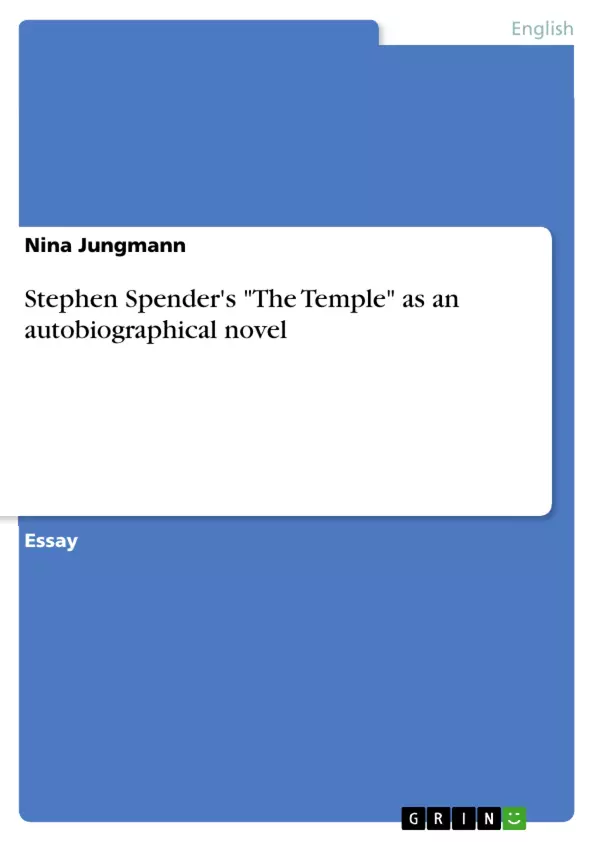In 1988 the author John Fuller had discovered a manuscript of Stephen Spender´s novel which was called The Temple and was dated 1929. Spender originally wrote this novel in the late 1920s in order to tell his life during his student days. “He sent several copies to friends, among them Auden and Isherwood to get their views about it, and a copy to Geoffrey Faber, his publisher, who pointed out that there could be no question of publishing a novel, which, besides being libelous, was pornographic according to the law at that time.” (Spender 1988 x) Hence, Spender’s work was not published and fell into oblivion. Over all those years Spender forgot that in the financial crisis he had sold his manuscripts to Texas in 1962 However, in 1988 John Fuller discovered the original manuscript and encouraged Spender to revise his work and to publish it. As he did so, in the introduction of The Temple he wrote the following: “This is an autobiographical novel in which the author tries to report truthfully on his experiences in the summer of 1929.” (Spender 1988 xi) In the following I will try to analyze whether The Temple really could be classified as an autobiographical novel or whether we are dealing with any other type of text.
The main question that we have to ask then is, what is autobiography or rather what is an autobiographical novel and what is the difference between those two types of texts? Is it even possible to define autobiography or the term autobiographical novel? When we look those terms up in various dictionaries, for autobiography they mostly all have in common one rather short definition that on the first view explains the term very well: “Autobiography is the history of a person’s life as written by himself.” (Porter Abbot 1988 598) The term autobiographical novel in most dictionaries is not even listed, therefore I will at first concentrate on the definition of autobiography.
Inhaltsverzeichnis (Table of Contents)
- Stephen Spender's The Temple as an Autobiographical Novel
- Autobiography - definition and its problems
- Lejeune's definition of autobiography
- The Temple: is it an autobiography or an autobiographical novel?
Zielsetzung und Themenschwerpunkte (Objectives and Key Themes)
This essay aims to analyze whether Stephen Spender's novel The Temple can be categorized as an autobiographical novel. The essay explores the definition of autobiography and examines the relationship between Spender's life and his novel.
- The definition of autobiography and its limitations
- The relationship between autobiography and fiction
- The role of identity in autobiographical writing
- The use of narrative voice and character in The Temple
- The intersection of personal experience, social history, and literary representation in autobiographical works
Zusammenfassung der Kapitel (Chapter Summaries)
- The essay begins by introducing Stephen Spender's novel The Temple and its unconventional publication history. The author then investigates the concept of autobiography, analyzing the traditional definition and its limitations.
- The essay further explores Philippe Lejeune's theory of autobiography, focusing on his definition and the criteria he establishes for identifying autobiographical works.
- The essay examines Spender's novel The Temple in light of Lejeune's theory, analyzing the narrative structure, character development, and the relationship between the author, the narrator, and the protagonist. The essay discusses the potential for The Temple to be classified as an autobiography or an autobiographical novel.
Schlüsselwörter (Keywords)
This essay delves into the core concepts of autobiography, exploring key themes of identity, narrative voice, and the relationship between personal experience and fictional representation. It examines the theoretical framework of Philippe Lejeune and analyzes Stephen Spender's novel The Temple in light of this theory.
Frequently Asked Questions
Is Stephen Spender's "The Temple" an autobiography or a novel?
Spender himself called it an "autobiographical novel". While it reports on his real experiences in the summer of 1929, it uses narrative techniques typical of fiction.
What is Philippe Lejeune's definition of autobiography?
Lejeune defines autobiography as a retrospective prose narrative produced by a real person concerning their own existence, focusing on their individual life and the history of their personality.
Why was "The Temple" not published when it was first written?
Written in the late 1920s, the manuscript was considered potentially libelous and "pornographic" according to the strict laws of that time, leading Spender's publisher to reject it.
What is the "autobiographical pact"?
It is a concept by Lejeune where the author, narrator, and protagonist share the same name, creating a contract of truthfulness with the reader.
How was the manuscript of "The Temple" rediscovered?
The author John Fuller discovered the manuscript in 1988, years after Spender had sold his papers to Texas and forgotten about the specific draft from 1929.
- Arbeit zitieren
- Nina Jungmann (Autor:in), 2011, Stephen Spender's "The Temple" as an autobiographical novel, München, GRIN Verlag, https://www.grin.com/document/173119



